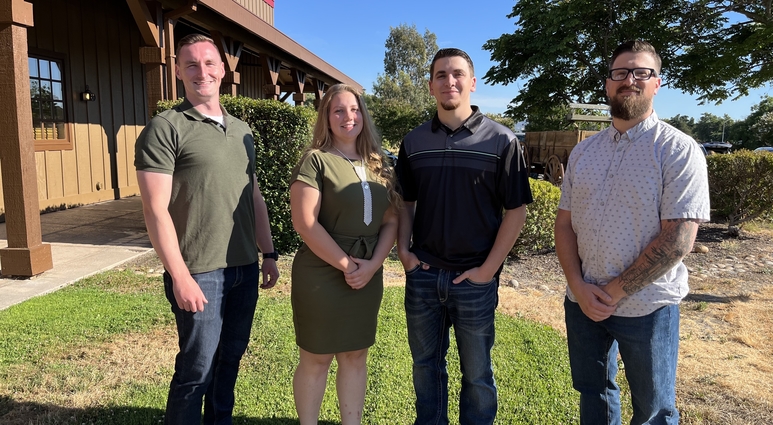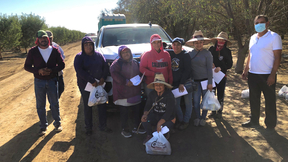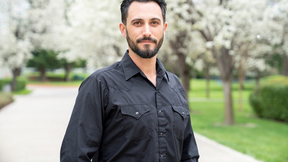Lab’s newest machinists celebrate graduation from vaunted apprenticeship program
 (Download Image)
(Download Image)
At a July 27 ceremony, Lawrence Livermore National Laboratory leadership recognized the latest crop of four graduates from the Machinist Apprenticeship Program for finishing the four-year program and earning their state machinist certificates. Pictured are graduates (from left): Daniel Hoffmann, Dawn Hill, Travis Labat and Corey Beith. Photo: Jeremy Thomas/LLNL.
Lawrence Livermore National Laboratory Engineering leadership recently congratulated the latest graduates from the Machinist Apprenticeship Program at a ceremony marking their completion of the program and transition to state-certified machinists.
During the ceremony, held at the traditional Cattlemen’s Steakhouse in Livermore, Lab leaders, current and former apprentices and families recognized the four graduates — Corey Beith, Dawn Hill, Travis Labat and Daniel Hoffmann — for finishing the intensive four-year program and earning their state machinist certificates.
Hill, one of only about 15 women apprenticeship graduates in the program’s nearly 70-year history, came to the program right out of Modesto Junior College and found the moment “bittersweet.” She said she will miss the camaraderie with her fellow apprentices and learning on a variety of tools and machines and expressed hopes that other women would try machining.
“The glass ceiling was broken a long time ago — I just went out and did it,” Hill said. “If you focus on your work and you put out good parts, it turns out a lot of men respect that. Sometimes I get asked, ‘what's it like being a woman in machining?’ almost as if I'm dealing with a disability. I haven't had many problems; if you set your mind to something, you're going to do it. If you’re enthusiastic coming to work, people are going to like you and people are going to be excited to teach you.”
Labat, a senior machinist who applied twice for the highly competitive program on the recommendation of his shop teacher at Chabot College, said the apprenticeship was a “great experience” that allowed him to make major strides in improving his machining skills. He looks forward to “giving back” and helping future apprentices.
“It's a pretty big accomplishment for me,” Labat said. “This was really my first machinist job, so getting through school, starting off with super-simple stuff and seeing what it could become in four years was a pretty amazing thing. And to celebrate with everybody here is huge. This is a brotherhood, a big family; everyone's super supportive and they're all in it just as much as you are.”
Since being instituted in 1954, the Lab’s apprenticeship, widely regarded as one of the premier programs of its kind in the state, has graduated 198 total apprentices, most of whom have continued their careers at the Lab as full-time machinists. The program requires each graduate to complete 8,000 hours of on-the-job training under journey-level mentors as well as 200-plus hours of classroom instruction on technical theory. The graduates, a select group that numbers only about 4-5 each year, are rewarded with a certificate qualifying them to be machinists anywhere in the state.
The ceremony featured a presentation of the hard-earned certificates and remarks from Lab directorate and apprentice program leadership, who turned out for the event to show their support. Engineering Associate Director Anup Singh praised the cohort for their dedication and direct contributions to the nation’s nuclear deterrence, as well as helping to keep U.S. manufacturing competitive on a global scale.
“What you do in our machine shops, there is nothing else that can be more cutting-edge than that,” Singh said. “There are leaders from Engineering and the Laboratory here who are in complete support of this program, and you know why? Because it is important for this country to have programs like this.”
California Division of Apprenticeship Standards representative Herschel Baser lauded the program for “setting the standard for what advanced manufacturing is supposed to be throughout the state,” and commended the graduates on being “the cream of the crop” for trained machinists.
Engineering Senior Superintendent Randy Pico thanked the families for their support and the graduates for carrying on a tradition of excellence at the Lab. Training Manager for the Engineering Directorate Terry King called the event a “very special moment for the Lab” and a time to celebrate the sacrifice of the apprentices and their families.
The evening was extra meaningful for LLNL Engineering Section Leader Rich Seugling and Apprenticeship Program Coordinator Jason Carroll, because this was the first graduation of a group they helped to hire.
“It's especially rewarding for me to see them start their careers and now they’re here [at graduation],” Carroll said. “I’m looking forward to watching them grow. I know they all have enormous potential, and I can't wait to see what they do.”
Seugling told graduates: “You’ve got to remember the bigger picture; what we do in support of the stockpile mission is a huge thing, and what you've gone through over the last four years has trained you to support that mission. What I hope that you take away from it is the value, the interest and the experience that you're going to gain not only from what you did now, but we're going to do in the future.”
The Lab’s newest machinists are joining LLNL at a critical time for Engineering, according to Materials Engineering Division Leader Chris Spadaccini, who added that he’s been privileged to see the important work that machinists do firsthand.
“What you do is incredible, highly skilled and precise — the kind of machining that can't be done anywhere else in the world,” Spadaccini said. “Whether it's the stockpile mission or Global Security, or [National Ignition Facility] & Photon Science, these are really important missions, and the things that you do and the things that you make, nobody else can make. The rubber really meets the road in the shops with all of you.”
Apprenticeship program graduate and senior machinist Hoffmann, formerly a teaching assistant in Chabot College’s Machine Tool Technology program, said he will continue working in the Lab’s target fabrication shop, where he is looking forward to “making good parts for critical programs.”
“There’s a saying that the apprenticeship is what you make of it,” Hoffman said. “For me, it's been challenging, but rewarding. The taller the hill, the better the view. To be at the end is a relief, but now I'm at a skill level that I've achieved through the apprenticeship, and I get to continue performing at the Lab.”
Hoffman’s fellow graduate Beith, also a senior machinist, said he felt “a lot of gratitude” for the support he received and valued learning the precision aspects of machining during the program. He plans to improve his proficiency as he continues working in the Lab’s Special Materials Machining Facility group.
“It was a lot of hard work that went by really quickly,” Beith said. “Four years sounds long but was just a quick blip in time. I learned a lot. It’s just a great avenue to learn the skills that you need to be a quality machinist.”
Read more about LLNL’s Machinist Apprenticeship Program.
Contact
 Jeremy Thomas
Jeremy Thomas
[email protected]
(925) 422-5539
Related Links
LLNL’s Machinist Apprenticeship ProgramApprentice program graduates look forward to careers as Lab machinists
Tags
EngineeringCareers
Community Outreach
Featured Articles







